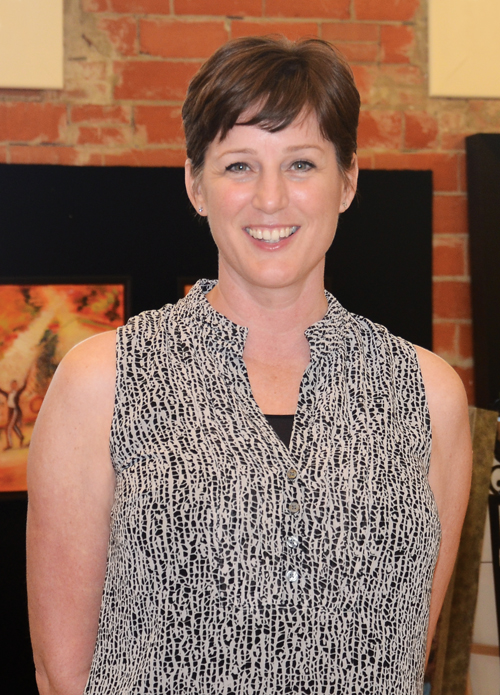
As AIDS Foundation Houston Turns 30, What’s Next?

A Q&A with the new CEO
by Marene Gustin • Photo by Dalton DeHart
Houston:1982. Kathy Whitmire was inaugurated as the first female mayor, The Who played the Astrodome, and AIDS Foundation Houston opened its doors as the first AIDS Service Organization in Texas.
This year, the nonprofit turns the big 3-0 with a 2012 operating budget of $7.4 million. The organization owns two apartment buildings, offers permanent and transitional housing assistance, legal aid, transportation, the Stone Soup Food Assistance Program, information, and referrals.
OutSmart sat down recently for a conversation with the organization’s new CEO, 43-year-old Kelly Young. The Oregon native has worked at Houston nonprofits for 14 years, including a 10-year stint with the Houston Area Women’s Center and most recently as the executive director of The Women’s Fund. Young is married with two Shih Tzu “kids,” Sophie and Scout.
OutSmart: AFH is turning 30 this year, but you’ve only recently starting helming the organization, right?
Kelly Young: Actually, today is my one-month anniversary here. AFH has a highly committed group of people, which always makes my job easier coming in.
So why did you want to come to AFH?
It was a dream job. Opportunities to run a long-standing operation like this don’t come around very often, so I jumped at this. I love my job here.
Have you been affected by AIDS personally?
I had a couple of close friends who were in the high-risk group, so I was part of their support system. And working with survivors of sexual violence, I was very aware of it. And just the whole issue of fairness and equality, when AIDS first became a concern, really bothered me.
How are things different at AFH now, and in Houston in general, than they were 30 years ago?
In general, the prevention and treatment of HIV/AIDS has changed drastically since then, but the basic necessities of people living with the virus have not changed—dealing with the stigma, housing, and nutrition needs. There are so many great organizations for medical treatment out there now. So on our anniversary we’re looking at how we go forward. Are there some things we can let go of? And that’s why we are turning more to support and education. We were the first and one of the last food pantries, because you have to have good nutrition for the newer meds to work. You have to have a pretty structured life to manage the medical side of this virus, and that’s hard to do if you are homeless and hungry. The stress of worrying about where you are sleeping and what you are eating tomorrow makes any disease worse. And there are health risks associated with living in unsanitary environments. We have to get these people off the street and into safe, healthy environments.
It’s easier to understand the spread of HIV in the homeless population, but HIV/AIDS cases are on the rise in Houston in other populations as well. What is contributing to that?
One of the fastest-growing segments of new cases is in low-income women and children. And there’s the fact that Houston sees a lot of recently released inmates arrive here. They are given only 10 days of medication from the prison system, so it’s important that we reach out to them and get them into support programs quickly. And part of the reported increase in HIV is due to more testing, although only 21 percent of Texans were tested last year. We partner with the City of Houston Health Department in Hip Hop 4 HIV to test 8,000 young adults in two months. Texans who are most likely to test late are males and Hispanics. Today 1 in 93 Houstonians are living with HIV, or 1 in 53 among African-Americans. According to the Centers for Disease Control and Prevention, Houston ranks eighth in the country for cumulative cases, and every seven hours another Houstonian is diagnosed with HIV.
So even as prevention and treatments are making major strides, we still are seeing new cases? How does that bode for AFH in the future?
In the next three to five years, I’d like to see us [become a greater] community resource.
And in 30 years?
What I would hope is that we ultimately become a historical museum of what happened. Or I would hope our doors would be closed. But realistically, we might still be working to help people.
It’s sobering to think that AFH might still be needed then. After three decades of battling HIV/AIDS, we now have preventive drugs to help those infected with the virus to lead normal lives. For a lot of folks in the mainstream, HIV/AIDS seems less threatening than it was 30 years ago. No more screaming headlines. HIV/AIDS is no longer the disease of the week, and that must affect fundraising.
I think my job here is not to let that marginalization happen. A lot of our programs are funded by government grants, so we are subject to politics. I have to make donors realize that we are subject to those whims, that we may not always have that federal money. I would like to see more diversification in our funding so we aren’t so dependent on government dollars. We really will make a difference. So I ask people to donate and join us today.
Marene Gustin also writes about Tre Spa in this issue of OutSmart magazine.










